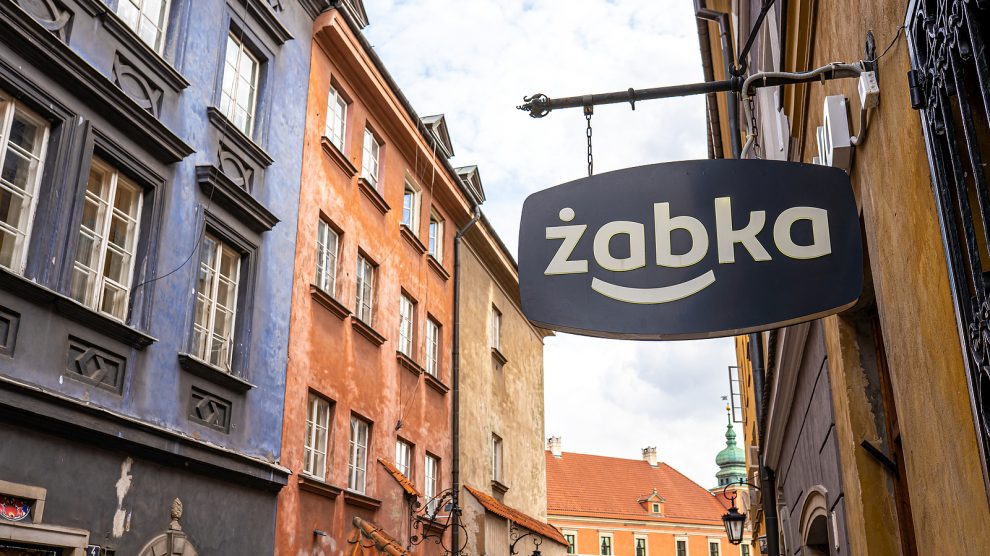Amid plans for a listing on the Warsaw Stock Exchange, Żabka places Romania, ‘an attractive adjacent market’ at the heart of its future growth.
Just weeks after Latvia’s airBaltic announced plans to launch an initial public offering (IPO), Luxembourg-based private equity firm CVC Capital Partners this week said that it was preparing to float shares in Polish retail giant Żabka on the Warsaw Stock Exchange (WSE).
CVC purchased Żabka in 2017.
Żabka’s management believes that the listing will strengthen Żabka Group’s public profile by way of increased attention and brand awareness among current and potential commercial partners as well as other interested parties.
- Investors eye airBaltic as IPO prepares for take-off
- Once considered peripheral, CEE has become integral to the EU’s economic wellbeing
- The emergence of CEE as a global investor
Since the business was founded in 1998, Żabka has grown to become Europe’s largest chain of convenience stores with more than 10,500 physical stores, with a distinct focus in recent years on digitalisation, developing meal solution apps, an eGrocery business, and autonomous, unmanned, AI-powered Żabka Nano stores.
“As consumers increasingly look for convenience, an IPO will allow Żabka Group to further capture the significant market opportunity that we see ahead of us,” says Tomasz Suchański, Żabka’s CEO.
“We have set clear and achievable medium-term targets to realise that opportunity, with an aim to double sales to end customers by 2028, while opening more than 1,000 stores per year in the medium term in Poland and Romania.
“We are confident that becoming a public company will benefit all of our stakeholders, creating value for shareholders and opportunities for our people, while also supporting local communities and entrepreneurship by providing our franchisees with the tools and knowledge to run their own businesses.”
Żabka Group sees an overall market opportunity for approximately 19,500 Żabka stores in Poland – where it claims 90 per cent brand recognition – and approximately 4,000 stores in Romania, a market it entered earlier this year under the brand name Froo.
As part of its expansion into Romania, the group acquired one of the country’s leading distribution firms, DRIM. Through the acquisition, Żabka Group gained access to a strong logistics platform serving 13,000 physical locations and an established supplier network.
To date, Żabka Group has already opened more than 20 stores in Romania and the rate of store openings in the country, which it labels an “attractive adjacent market” is expected to gradually increase as it continues to refine its proposition in the country.
Strong numbers
Sales to end customers increased 23 per cent 22.775 billion złoty in 2023, compared to 18.53 billion złoty in 2022. Similarly, revenue increased by 24 per cent, to 19.806 billion złoty in 2023.
This was mostly driven by a combination of like-for-like (LFL) growth (which amounted to 10.8 per cent in 2023) and expansion of Żabka Group’s store network (which increased by 1,100 gross store openings to 10,014 total stores at the end of 2023).
The increase was additionally supported by development of the digital customer offering segment, with sales increasing by 68 per cent year-on-year.
Adjusted EBITDA increased 17 per cent to 2.834 billion złoty.
Żabka is targeting high single digit (7.5-nine per cent) LFL growth in 2024 and mid-to-high single digit LFL growth in the medium term.
The group says that this will be underpinned by initiatives driving traffic and basket size through a combination of rolling out its Żabka Café 2.0 (an extended range of ready-meal solutions, warm snacks and street food), expanding its range of everyday services, continued innovation in products, traffic and basket initiatives, and further development and upgrade of its Żappka consumer app.
According to Bloomberg, the initial public offering could Żabka at as much as eight billion US dollars—several times CVC’s cost in 2017 of just over one billion euros.
The Żabka listing will also be good news for the Warsaw Stock Exchange and will likely cement its position as the largest and most important in the Central and Eastern Europe region.
Unlike many news and information platforms, Emerging Europe is free to read, and always will be. There is no paywall here. We are independent, not affiliated with nor representing any political party or business organisation. We want the very best for emerging Europe, nothing more, nothing less. Your support will help us continue to spread the word about this amazing region.
You can contribute here. Thank you.


